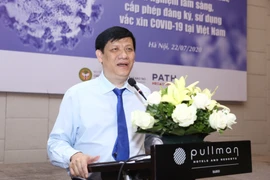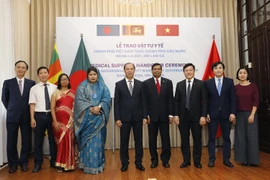 COVID-19 vaccine development at Vaccine and Biological Production No.1 Company (Vabiotech) under the Ministry of Health (Photo: VNA)
COVID-19 vaccine development at Vaccine and Biological Production No.1 Company (Vabiotech) under the Ministry of Health (Photo: VNA)Hanoi (VNS/VNA) - First phase of human trials on amade-in-Vietnam COVID-19 vaccine could begin as early as this October.
The Institute of Vaccines and Medical Biologicals (IVAC) inNha Trang city, partnering with New York City-based Icahn School of Medicineand the global health non-profit organisation PATH, expects to conduct testingon small groups of volunteers in October-December this year.
Phase 2, comprising larger groups of people, and Phase 3, comprisingup to thousands, will be conducted at the beginning of 2021.
The institute plans to submit documents for approval to thehealth ministry as early as April next year and claims to be capable ofproducing 30 million doses a year.
By October 2021, the vaccine could be distributed to thegeneral population.
IVAC is researching an egg-based vaccine, making use of theNewcastle disease virus (NDV) expressing the spike protein of SARS-CoV-2.
According to Duong Huu Thai, head of IVAC, the production ofits COVID-19 vaccine will be similar to the production of influenza vaccine.
The live NDV-Lasota-S virus – given to IVAC from its USpartner in May – is injected into a membrane of fertilised hen’s egg andcultivated, then the propagated viruses are extracted from the membrane to beinactivated while still maintain their physical properties.
The now inactivate virus, unable to cause disease, will stilltrigger the body’s immune response that can target the coronavirus.
The vaccine candidate has shown initial positive results inanimals, Thái said, but it was too early to claim success.
“In research, no one can claim to be successful until [thevaccine development] reaches the mass production stage,” he said.
Another firm, Vaccine and Biological Production No.1 Company(Vabiotech) under the Ministry of Health, partnering with the UK-basedUniversity of Bristol since February, said after trials on mice demonstratingstrong immune response to coronavirus, especially after the repeat shot, itaims to conduct trials on small groups of people at the beginning of next year.
Vabiotech is developing its vaccine candidate using theprotein subunit method, using only part of the SARS-CoV-2 virus to stimulatethe immune system to release antibodies.
“To deal with the diverse mutations of SARS-CoV-2, we havechosen the antigen that proved to have mutated the least,” said Do Tuan Dat,Chairman of Vabiotech, explaining that the vaccine, if successful, would helpachieve immunity against various different strains of the virus.
The company said it is optimising production procedures forlarge-scale production of the vaccine and could produce up to 100 million dosesa year.
Two other companies in Vietnam are researching a vaccine,including the Centre for Immunisation Vaccines POLYVAC partnering with theNational Institute of Hygiene and Epidemiology, which is still waiting forapproval from the Ministry of Science and Technology for its research.
The last is Nanogen Biopharmaceutical company in HCM City,using protein from the SARS-CoV-2 strain found in China’s Wuhan – where thevirus is thought to have first emerged – together with the mutated strainD614G, the dominant strain rapidly spreading across the world, including theongoing outbreak in Vietnam.
The health ministry has asked the two companies to startpreparing for large-scale manufacturing in case their vaccines are approved.
Nguyen Thu Van, member of Scientific Council under theMinistry of Health, said a Vietnamese-made COVID-19 vaccine could be obtained bythe end of 2021.
“If Vietnam can achieve that goal, that timeframe is alreadyexpedited. Usually, it takes at least five to six years to produce a newvaccine,” Van said.
Nguyen Ngo Quang, Vice Director of the Administration ofScience, Technology and Training under the Ministry of Health, said in ameeting last month that even with an expedited timeline, "the vaccine’squality must still be ensured and the product must be able to preventcoronavirus infection based on ethical principles in medical research".
Vietnam health authorities have many times insisted that areturn to 'normal' can only be achieved with a COVID-19 vaccine, and thecountry is aiming for self-reliance to make sure of sufficient distribution toall its population of 95 million.
The local research developments come as Russia’s PresidentVladimir Putin claimed Tuesday his country had created the world’s firstCOVID-19 vaccine, an announcement that met with safety concerns over a lack oftesting.
Vabiotech’s Dat told Lao Dong (Labour) newspaper that theyhave not considered buying the vaccine from Russia, as they need more data onclinical trials, which Russian scientists have not publicly shared data on.
He also said that data for vaccine development in the UK andthe US is public and readily accessible, aiding Vietnam in the making of its ownvaccine./.





























